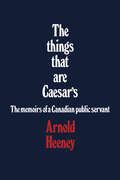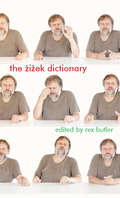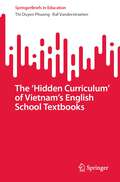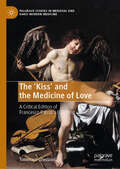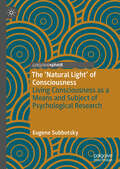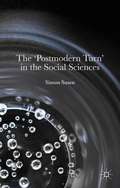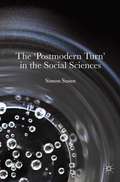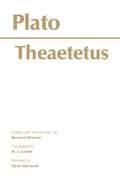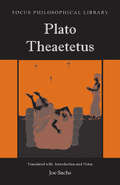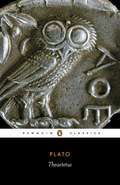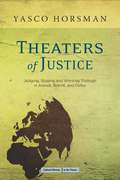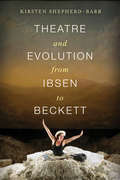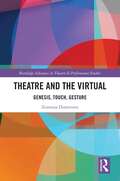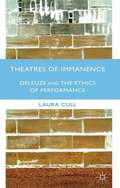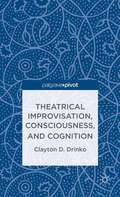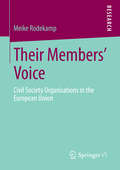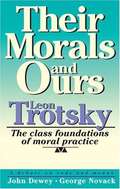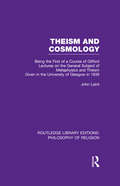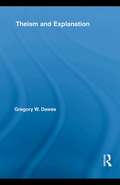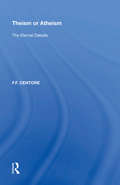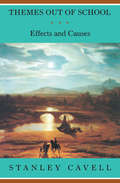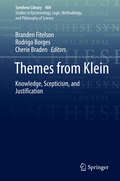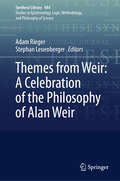- Table View
- List View
The things that are Caesar's: The memoirs of a Canadian public servant
by Brian HeeneyArnold Heeney had a distinguished career in the service of the government of Canada – as secretary to the cabinet, undersecretary of state for external affairs, ambassador to the North Atlantic Council, twice ambassador to the United States (1953-7 and 1959-62), and co-chairman of the International Joint Commission. His career in public administration began in 1938 when he left a growing law practice to become principal secretary to Prime Minister William Lyon Mackenzie King. Two years later he was appointed secretary to the cabinet, the first to hold this office, and for nine years, from 1940 to 1949, he kept the minutes and the secrets of the government of Canada. His memoirs recall his years of service; they form a lucid, modest, illuminating, and entertaining account of value to historians, political scientists, and other citizens interested in the workings of government. The first former mandarin to write his memoirs. Arnold Heeney sheds light, from intimate vantage points, on policy processes over thirty years as well as on a large cast of characters, domestic and foreign.
The Žižek Dictionary
by Rex ButlerSlavoj Žižek is the most popular and discussed philosopher in the world today. His prolific writings – across philosophy, psychoanalysis, political and social theory, film, music and religion – always engage and provoke. The power of his ideas, the breadth of his references, his capacity for playfulness and confrontation, his willingness to change his mind and his refusal fundamentally to alter his argument – all have worked to build an extraordinary international readership as well as to elicit much critical reaction. The Žižek Dictionary brings together leading Žižek commentators from across the world to present a companion and guide to Žižekian thought. Each of the 60 short essays examines a key term and, crucially, explores its development across Žižek’s work and how it fits in with other concepts and concerns. The dictionary will prove invaluable both to readers coming to Žižek for the first time and to those already embarked on the Žižekian journey.
The ‘Hidden Curriculum’ of Vietnam’s English School Textbooks (SpringerBriefs in Education)
by Raf Vanderstraeten Thi Duyen PhuongThis book analyzes the basic ideas and premises underlying the English textbooks used at the higher secondary school level in Vietnam from the 1980s to the present, from a sociological perspective. The dataset, upon which this book builds, consists of a collection of 18 textbooks, which belong to five sets of locally developed English textbooks for grade 10 to grade 12 students. These series were used in all public schools from the mid-1980s to the present. During this period, schooling expanded rapidly in Vietnam, while English also gained increasing prominence within the school system.This book examines the curricular content of these textbooks and presents a long-term analysis of the ‘hidden’ curricular content in light of Vietnam’s recent history and its government’s concerns about national identity.
The ‘Kiss’ and the Medicine of Love: A Critical Edition of Francesco Patrizi’s Il Delfino (Palgrave Studies in Medieval and Early Modern Medicine)
by Tommaso GhezzaniThis is a revised critical edition of philosopher and scientist, Francesco Patrizi's manuscript, Il Delfino, overo del bacio (c.1555), with an English translation and commentary. Il Delfino, or ‘The Kiss’ survives in a single manuscript, compiled by an assistant and interspersed with autograph corrections by Patrizi himself. The only modern critical edition of the text, edited by Danilo Aguzzi Barbagli (1975), is known to contain many errors that prevent a correct understanding of the work. This book therefore fills this historiographical gap and at the same time provides a reliable text for further translations of Patrizi's work into other languages.
The ‘Natural Light’ of Consciousness: Living Consciousness as a Means and Subject of Psychological Research
by Eugene SubbotskyThe book is about living consciousness: private subjective experience, which conforms to the laws of magic. The concept of living consciousness is employed to clarify disputable concepts such as natural psychological functions and artificial intelligence, to explore how living consciousness is reflected in visual art and fiction writings, and to show how living consciousness could be influenced in education to promote creative thinking, memory and differentiating perception.
The ‘Postmodern Turn’ in the Social Sciences
by Simon SusenSimon Susen examines the impact of the 'postmodern turn' on the contemporary social sciences. On the basis of an innovative five-dimensional approach, this study provides a systematic, comprehensive, and critical account of the legacy of the 'postmodern turn', notably in terms of its continuing relevance in the twenty-first century.
The ‘Postmodern Turn’ in the Social Sciences
by Simon SusenSimon Susen examines the impact of the 'postmodern turn' on the contemporary social sciences. On the basis of an innovative five-dimensional approach, this study provides a systematic, comprehensive, and critical account of the legacy of the 'postmodern turn', notably in terms of its continuing relevance in the twenty-first century.
Theaetetus
by Plato Bernard Williams Myles Burnyeat M. J. LevettM. J. Levett's elegant translation of Plato's Theaetetus, first published in 1928, is here revised by Myles Burnyeat to reflect contemporary standards of accuracy while retaining the style, imagery, and idiomatic speech for which the Levett translation is unparalleled. Bernard William's concise introduction, aimed at undergraduate students, illuminates the powerful argument of this complex dialogue, and illustrates its connections to contemporary metaphysical and epistemological concerns.
Theaetetus
by Plato Joe SachsThis is an English translation of Plato's dialogue concerning the nature of knowledge. In this dialogue, Socrates and Theaetetus discuss three definitions of knowledge: knowledge as nothing but perception, as true judgment and as true judgment with an account. Focus Philosophical Library translations are close to and are non-interpretative of the original text, with the notes and a glossary intending to provide the reader with some sense of the terms and the concepts as they were understood by Plato’s immediate audience.
Theaetetus
by PlatoSet immediately prior to the trial and execution of Socrates in 399 BC, Theaetetus shows the great philosopher considering the nature of knowledge itself, in a debate with the geometrician Theodorus and his young follower Theaetetus. Their dialogue covers many questions, such as: is knowledge purely subjective, composed of the ever-changing flow of impressions we receive from the outside world? Is it better thought of as 'true belief'? Or is it, as many modern philosophers argue, 'justified true belief', in which the belief is supported by argument or evidence? With skill and eloquence, Socrates guides the debate, drawing out the implications of these theories and subjecting them to merciless and mesmerising criticism. One of the founding works of epistemology, this profound discussion of the problem of knowledge continues to intrigue and inspire.
Theaters of Justice: Judging, Staging, and Working Through in Arendt, Brecht, and Delbo
by Yasco HorsmanWhat role do legal trials have in collective processes of coming to terms with a history of mass violence? How does the theatrical structure of a criminal trial facilitate and limit national processes of healing and learning from the past? This study begins with the widely publicized, historic trials of three Nazi war criminals, Eichmann, Barbie, and Priebke, whose explicit goal was not only to punish, but also to establish an officially sanctioned version of the past. The Truth and Reconciliation commissions in South America and South Africa added a therapeutic goal, acting on the belief that a trial can help bring about a moment of closure. Horsman challenges this belief by reading works that reflect on the relations among pedagogy, therapy, and legal trials. Philosopher Hannah Arendt, poet Charlotte Delbo, and dramaturg Bertolt Brecht all produced responses to historic trials that reopened the cases those trials sought to close, bringing to center stage aspects that had escaped the confines of their legal frameworks.
Theatre and Evolution from Ibsen to Beckett
by Kirsten Shepherd-BarrReveals the deep, transformative entanglement among science, art, and culture in modern times
Theatre and the Virtual: Genesis, Touch, Gesture (Routledge Advances in Theatre & Performance Studies)
by Zornitsa DimitrovaTheatre and the Virtual lays out a set of conceptual instruments for the articulation and engendering of the forces of theatrical potentiality. Creating a passage toward a reconstitution of the given, a theatre of the virtual opens bodies in motion to a region of an ongoing genesis of forces. The outcome: regimes of constraint are abandoned through a radical practice of ecological attunement. Violence is eschewed through an onto-ecology of touch. Closed systems are repotentialised to become co-constitutive of their environments. A logic of spectrality settles in—not so much entities as atmospheres, not so much a being as a style of being, not so much a body as multitudinous milieus of response. This is the task of a theatre of the virtual—to safeguard the possibility of the extra-epistemological and uphold one’s right to offer accounts of oneself from outside of being, all the while creating a fractured record of the wondrous mutations of a moving, gesturing body. This book will be of great interest to students and scholars in theatre, philosophy, new materialisms, environmental humanities, gesture, and the ontology of response.
Theatres of Immanence
by Laura CullTheatres of Immanence: Deleuze and the Ethics of Performance, now available in paperback, is the first monograph to provide an in-depth study of the implications of Gilles Deleuze's philosophy for theatre and performance. Engaging with a wide range of interdisciplinary practitioners including Goat Island, Butoh, Artaud, John Cage, the Living Theatre, Robert Wilson and Allan Kaprow, as well as with the philosophies of Deleuze and Guattari, Henri Bergson and Fran#65533;ois Laruelle, the book conceives performance as a way of thinking 'immanence': the open and endlessly creative whole of which all things are a part. Theatres of Immanence builds upon Deleuze's emphasis on immanence, affect, change and movement to provide new approaches to five key topics in theatre and performance: 1) authorship and collaboration, 2) voice and language, 3) animals in performance, 4) audience participation and 5) time or duration. The book provides an accessible introduction to Deleuze's ideas and draws attention to the ethical dimensions of performance, asking: 'what good is theatre, and particularly immanent theatre, anyway?
Theatrical Improvisation, Consciousness, and Cognition
by Clayton D. DrinkoImprovisation teachers have long known that the human mind could be trained to be effortlessly spontaneous and intuitive. Drinko explores what these improvisation teachers knew about improvisation's effects on consciousness and cognition and compares these theories to current findings in cognitive neuroscience, psychology, and philosophy.
Their Members' Voice
by Meike RodekampThe role of civil society organisations in Brussels is debated. Some view them as representatives of their members and thus as legitimising agents for policy-making in the European Union. Others see them as being elitist and out of touch with their membership bases, therefore ill-suited to promote democracy at the EU level. Taking civil society organisations in the EU's external relations as an example, Meike Rodekamp submits these controversial views to a reality check. Interviews with representatives of civil society organisations in Brussels and their member organisations in the EU show that the Brussels offices have not lost contact with their members. However, member organisations differ substantially in their participation in internal decision-making processes, which raises doubts about the legitimacy gains through civil society participation in EU policy-making.
Their Morals And Ours: The Class Foundations Of Moral Practice
by John Dewey Leon Trotsky Victor Serge George NovackParticipating in the revolutionary workers movement "with open eyes and an intense will--only this can give the highest moral satisfaction to a thinking being," Trotsky writes. He explains how morality is rooted in the interests of contending social classes. With a reply by the pragmatist philosopher John Dewey and a Marxist response to Dewey by George Novack. Glossary, index.
Theism and Cosmology: Being the First Series of a Course of Gifford Lectures on the General Subject of Metaphysics and Theism given in the University of Glasgow in 1939 (Routledge Library Editions: Philosophy of Religion)
by John LairdTheism is one of the major types of metaphysics and cosmology is the general theory of the whole wide world. Must the world have an over-worldly source, or any source? Would "space" crumble unless God perpetually sustained it by his brooding omnipresence? Is all power, properly understood, divine power? These large questions, never out of date, are examined by Professor Laird in the light of contemporary philosophy. This seminal work, originally published in 1940 is a lucid and profound discussion in theological philosophy.
Theism and Explanation (Routledge Studies in the Philosophy of Religion)
by Gregory W. DawesIn this timely study, Dawes defends the methodological naturalism of the sciences. Though religions offer what appear to be explanations of various facts about the world, the scientist, as scientist, will not take such proposed explanations seriously. Even if no natural explanation were available, she will assume that one exists. Is this merely a sign of atheistic prejudice, as some critics suggest? Or are there good reasons to exclude from science explanations that invoke a supernatural agent? On the one hand, Dawes concedes the bare possibility that talk of divine action could constitute a potential explanation of some state of affairs, while noting that the conditions under which this would be true are unlikely ever to be fulfilled. On the other hand, he argues that a proposed explanation of this kind would rate poorly, when measured against our usual standards of explanatory virtue.
Theism or Atheism: The Eternal Debate
by F.F. CentoreFrom the time of the thinkers of ancient Greece, the question of what can be said about the existence and nature of God has been debated by many philosophers and theologians. In Theism and Atheism: The Eternal Debate, F.F. Centore presents a broad analysis of the major positions that address the question and the thinkers who have contributed to the debate. This is an admirably lucid and thorough examination of the history of natural theology. Covering the material in a thematic rather than in a strictly chronological way, Centore draws out the key positions on topics such as the relationship of science and religion, the problem of evil, Naturalistic and Supernaturalistic theism and the dispute between essence and existence. The proponents of the various positions are considered alongside their most explicit critics. Important thinkers dealt with in this work include Plato, Aristotle, Aquinas, Descartes, Pascal, Kant, Hume, Hegel, Nietzsche, Freud and Darwin. The diversity of exploration also goes beyond the Judeo-Christian tradition to look at Hinduism, Buddhism, Stoicism, Zoroastrianism, Confucianism and Classical Paganism. This work, however, is much more than a survey of the major historical arguments and rebuttals concerning God's existence and nature. Overall, it is a work by a well-established Catholic philosopher who concludes that God's existence and nature are indeed compatible with modern science, human freedom and the existence of evil in the world.
Themes Out Of School: Effects and Causes
by Stanley CavellIn the first essay of this book, Stanley Cavell characterizes philosophy as a "willingness to think not about something other than what ordinary human beings think about, but rather to learn to think undistractedly about things that ordinary human beings cannot help thinking about, or anyway cannot help having occur to them, sometimes in fantasy, sometimes as a flash across a landscape. " Fantasies of film and television and literature, flashes across the landscape of literary theory, philosophical discourse, and French historiography give Cavell his starting points in these twelve essays. Here is philosophy in and out of "school," understood as a discipline in itself or thought through the works of Shakespeare, Molière, Kierkegaard, Thoreau, Brecht, Makavejev, Bergman, Hitchcock, Astaire, and Keaton.
Themes from Klein: Knowledge, Scepticism, and Justification (Synthese Library #404)
by Branden Fitelson Rodrigo Borges Cherie BradenThis volume features more than fifteen essays written in honor of Peter D. Klein. It explores the work and legacy of this prominent philosopher, who has had and continues to have a tremendous influence in the development of epistemology. The essays reflect the breadth and depth of Klein's work. They engage directly with his views and with the views of his interlocutors. In addition, a comprehensive introduction discusses the overall impact of Klein's philosophical work. It also explains how each of the essays in the book fits within that legacy. Coverage includes such topics as a knowledge-first account of defeasible reasoning, felicitous falsehoods, the possibility of foundationalist justification, the many formal faces of defeat, radical scepticism, and more. Overall, the book provides readers with an overview of Klein’s contributions to epistemology, his importance to twentieth and twenty-first-century philosophy, and a survey of his philosophical ideas and accomplishments. It's not only a celebration of the work of an important philosopher. It also offers readers an insightful journey into the nature of knowledge, scepticism, and justification.
Themes from Klein: Knowledge, Scepticism, and Justification (Synthese Library #404)
by Branden Fitelson Rodrigo Borges Cherie BradenThis volume features more than fifteen essays written in honor of Peter D. Klein. It explores the work and legacy of this prominent philosopher, who has had and continues to have a tremendous influence in the development of epistemology. The essays reflect the breadth and depth of Klein's work. They engage directly with his views and with the views of his interlocutors. In addition, a comprehensive introduction discusses the overall impact of Klein's philosophical work. It also explains how each of the essays in the book fits within that legacy. Coverage includes such topics as a knowledge-first account of defeasible reasoning, felicitous falsehoods, the possibility of foundationalist justification, the many formal faces of defeat, radical scepticism, and more. Overall, the book provides readers with an overview of Klein’s contributions to epistemology, his importance to twentieth and twenty-first-century philosophy, and a survey of his philosophical ideas and accomplishments. It's not only a celebration of the work of an important philosopher. It also offers readers an insightful journey into the nature of knowledge, scepticism, and justification.
Themes from Weir: A Celebration of the Philosophy of Alan Weir (Synthese Library #484)
by Adam Rieger Stephan LeuenbergerThis book celebrates and explores some philosophical issues raised by the work of Alan Weir, who is Professor Emeritus at the University of Glasgow, having previously held positions at the Universities of Oxford, Edinburgh and Queen’s, Belfast. In a number of areas, Weir has elaborated strikingly original views which involve a radical departure from the mainstream. These include formalism in the philosophy of mathematics, and as well as naïve set theory, with a universal set, and a naïve theory of truth. In contrast to other contemporary defenders of the latter two theories, Weir rejects dialetheism and accepts classical rules for the logical connectives. He avoids contradictions by restricting certain structural inference rules, specifically some generalized versions of transitivity. In addition, Weir has developed radical versions of naturalism and physicalism (partly informed by his work on Quine) and perceptual realism. This collection includes contributions by a distinguished group of philosophers on Weir’s philosophy, as well as a memoir and a new essay on the philosophy of mathematics by Weir himself.
